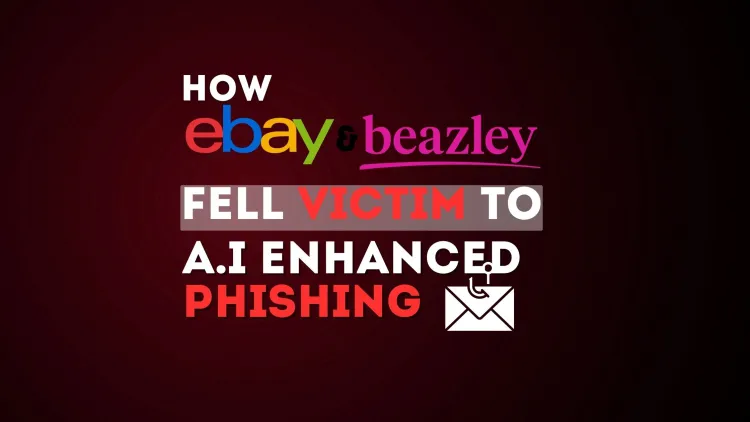How eBay and Beazley Fell Victim to AI-Enhanced Phishing Attacks
Recent reports reveal that eBay and Beazley have been targeted by AI-generated phishing scams, which leverage artificial intelligence to craft highly personalized and convincing emails aimed at company executives. Unlike traditional phishing attempts, these scams utilize data scraping and AI tools to create polished emails that bypass traditional security filters. Experts emphasize the urgent need for AI-powered security solutions, employee training, and improved data privacy to combat these sophisticated cyber threats. The rise of such attacks highlights the vulnerabilities in modern cybersecurity and the necessity for proactive defense mechanisms.

In recent news, eBay and Beazley, a UK-based insurance firm, have become the latest victims of AI-generated phishing scams. These sophisticated attacks leverage artificial intelligence to craft highly personalized and convincing emails, targeting high-level executives and bypassing traditional security filters.

Company Executives Being Targeted by AI Phishing Scams
According to a report by Financial Times, companies like eBay and Beazley have experienced a surge in fraudulent emails aimed at their executives. Unlike conventional phishing attempts that are generic and filled with errors, these AI-powered scams stand out due to their precision and personalization.
How AI Enhances Phishing Scams
| Feature | Description |
|---|---|
| Data Scraping and Analysis | AI systems scrape vast amounts of publicly available data to gather detailed information about company employees. |
| Personalized Messaging | By incorporating personal details and using emotive language, these emails appear more legitimate and engaging. |
| Avoiding Detection | AI tools ensure that these phishing emails lack grammatical errors or other red flags typically associated with scams, making them harder to detect. |
Challenges Posed by AI-Generated Phishing Scams
-
Ineffective Security Filters: Traditional email filters struggle to identify these polished phishing emails, allowing them to reach intended targets.
-
Higher Success Rates: The personalized nature of these emails increases the likelihood of recipients falling victim to the scams.
-
Lower Entry Barriers: Generative AI tools make it easier for attackers to execute these scams with minimal effort and technical expertise.
Insights from Experts
Kirsty Kelly, Chief Information Security Officer at Beazley, noted that these phishing attacks are likely a result of extensive data scraping about employees. The detailed and personal nature of the emails suggests that AI is a key component of these attacks.
Meanwhile, Nadezda Demidova, a cybercrime security researcher at eBay, highlighted the growing volume of cyber attacks facilitated by generative AI. She expressed concern over "polished and closely targeted" phishing scams, which are becoming increasingly difficult to combat.
How AI-Generated Phishing Scams Differ from Traditional Ones
-
Traditional Phishing Scams:
-
Impersonal and generic content.
-
Frequent grammatical and spelling errors.
-
Lower success rates due to lack of credibility.
-
-
AI-Generated Phishing Scams:
-
Highly personalized and data-driven.
-
Polished and professional language.
-
Greater emotional appeal, leading to higher response rates.
-
Implications for Cybersecurity
The rise of AI-generated phishing scams underscores the urgent need for organizations to adopt advanced cybersecurity measures. Basic security filters are no longer sufficient to combat these sophisticated threats. Companies must invest in:
-
AI-Powered Security Solutions: Tools capable of detecting and countering AI-generated attacks.
-
Employee Training: Regular workshops to educate staff about recognizing and reporting phishing attempts.
-
Enhanced Data Privacy: Minimizing the amount of publicly available employee information to reduce vulnerability.
Conclusion
The evolution of phishing scams through the integration of AI poses a significant challenge to organizations worldwide. As seen in the cases of eBay and Beazley, even major corporations are not immune to these advanced threats. By leveraging AI for both defense and awareness, companies can stay ahead in the cybersecurity game. The fight against cybercrime requires constant vigilance, innovation, and proactive measures to safeguard sensitive information and maintain trust in a digital-first world.
FAQs
-
What is an AI-generated phishing scam?
AI-generated phishing scams use artificial intelligence to craft highly personalized and convincing phishing emails, often targeting high-level executives. -
Why are eBay and Beazley significant targets?
These companies are high-profile and possess valuable data, making them prime targets for cyber attackers. -
How do AI tools enhance phishing scams?
AI enables attackers to scrape employee data, create personalized messages, and avoid detection by traditional security filters. -
What makes AI-generated phishing scams more dangerous than traditional ones?
They are highly personalized, lack grammatical errors, and use emotional language to increase credibility and response rates. -
How do traditional email filters fail against these scams?
Basic filters are not equipped to detect the polished and professional nature of AI-generated phishing emails. -
What data do attackers scrape for phishing scams?
Publicly available employee details, including names, roles, email addresses, and other personal information. -
What cybersecurity measures can combat AI-generated phishing scams?
Companies can use AI-powered security tools, conduct regular employee training, and enhance data privacy. -
Why is employee training essential?
Educating employees helps them recognize phishing attempts and report them promptly, reducing the success rate of such attacks. -
What role does data privacy play in preventing phishing attacks?
Minimizing the publicly available data about employees reduces the chances of attackers crafting personalized phishing emails. -
What is the future outlook for AI in cybersecurity?
While AI poses significant threats, it also offers advanced tools for detection and prevention, making it a double-edged sword in cybersecurity.














![Top 10 Ethical Hackers in the World [2025]](https://www.webasha.com/blog/uploads/images/202408/image_100x75_66c2f983c207b.webp)








